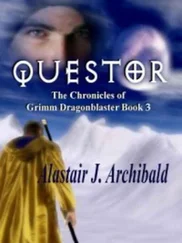She went back to the house. Lucie was sick in bed. She’d got a runny nose from going into the camp refrigerators without her wool scarf. The adolescent got undressed and lay down to watch her sleep. Lucie had a big compress over her forehead and eyes and she rasped as she breathed.
For several days she’d been hearing the wolf at night as it howled outside. Those were the tracks she was looking for and she’d found some but she knew they were dog tracks. No one was talking about the wolf and no one had heard the wolf except her, who even thought she could understand its baying. Every night, far, very far beyond the borders of the village, past the railway line and the rock quarry, the wolf howled and said to her “When the time comes, when I’ll have decided, you’ll go mad.”
The people in the village were not like the animals and they didn’t expel the weakest members of the pack. They kept the demented in houses and fed them but everyone looked at them as if they were dead, with death in their eyes. She didn’t want to be gazed at like that. She didn’t ever want to go mad and she did everything she could under the covers, plugging her ears so as not to hear the baying of the wolf.
At the foot of the bed, between her legs, she felt a weight pulling on the quilt and flattening the mattress. A little girl was sitting there and looking at her.
The little girl said:
“He doesn’t touch us any more because when you get older you become fat and ugly.”
“No, it’s because I’m becoming a woman.”
“Little girls like me always go mad.”
“No. Not if they’re not afraid of being afraid any more, not if they become like me, an animal that refuses to let itself be touched or to let itself die or to let itself be caught. Me, I’m going to run in my dreams until no one can find me.”
“You won’t succeed.”
“There are afternoons when he didn’t catch us and you know it. I’m dreaming of those now.”
“At the gates of the town a wolf is howling and you’re the only one to hear it. You’re already mad.”
“You don’t understand. The wolf is with me. He’s protecting me from monsters and little gods and you.”
The little girl said:
“Idiot. He’s come to devour us.”
“Yes, but he won’t let anyone do it except for him.”
The day was going to be hard with two hands less but Friday was the day for junk food. The cadets ate Pogos and poutine and pizzas and there was less work for the women in the kitchen.
She left the house alone at dawn and alone crossed the fields of the Lord up to the Third Line and walked alone through Monsieur Béliveau’s fields and along Lac Brochet’s gravel road. Autumn was coming early and the nights were cold but the August sun that rose over the dew was as warm as that of July and this afternoon it would shine incongruously on the red leaves and the tree branches drained of all their sap.
She’d not taken a hundred steps along the hydroelectric company road when she heard behind her a horse’s hooves striking the hard-packed ground. She stayed where she was to let the horse pass. Monsieur Robertson stopped beside her. He was wearing his beautiful white hat and black leather pants and a brand new white shirt and was mounted on his handsomest horse, solid black. Together they seemed to have escaped overnight from an old cowboy film and of having trotted that far without any notion at dawn that this was a world of colour.
“Bonjour, Mad’moiselle.”
“Bonjour, Monsieur Robertson.”
“You’re all alone?”
“Yes. My sister’s sick.”
“Ah.”
He looked at her and looked at the ground and looked at her again and turned and spat on the ground.
“Good day, then.”
“Good day.”
The horse and rider moved on. They went thirty metres at a walk and then turned and came back at a trot. Monsieur Robertson stopped his horse just in front of her in the road.
“I guess no one’s ever arrived at the cadet camp on horseback?”
“Never.”
He smiled.
“Come, climb on up.”
He shifted his weight and lifted one leg in the air so she could put her foot in the stirrup and he held out his arm and helped her to swing from left to right into the saddle. She moved her pelvis around a bit before finding a comfortable position.
“Is that all right?”
“Yes.”
She stretched her arms around him and he clicked his tongue and the horse began to advance at a walk and then at a trot. After a few minutes, Monsieur Robertson asked:
“Do you want to gallop?”
“Yes.”
“Hang on tight.”
He struck the horse’s sides with the heels of his boots and the horse altered its pace and went faster and faster. She felt the horse’s body working beneath her and for a fraction of a second all three of them were hurtling through the air and a moment later hitting the ground and she felt as if she were caught in the midst of a struggle between two ancient forces, one that distanced them from the ground and the other that pulled them back and she felt that the ground and the earth beneath her were trying to strike at her through the horse but the horse was absorbing the shock with its body to protect her from the blows.
Monsieur Robertson turned his head a little and cried:
“Are you afraid?”
She wrapped her arms around him a bit tighter and said:
“No.”
The men say:
She came from the ends of the earth with pebbles in her pockets.
We never knew anything else. Very little, in any case.
She came from the ends of the earth with pebbles in her pockets, and she lived for a while in the boarding house of Akira Gengei, the innkeeper. He knew her best. But very little, he says. He does know that back there, where she came from, things happened to her that shouldn’t happen to a woman and especially not a child. He says he doesn’t know why she came here, and probably neither does she. After, she bought old Mifune’s house and we never learned anything more.
We don’t much like foreigners around here, but even if this was before the war, there was already a fascination, in the cities and the countryside, for the West. For America, especially.
She made a place for herself. We never knew if she truly became a subject of the Empire, but after a while she had herself called Misaka. Because she never gave any other name. And since soon the people of Sapporo and Asahikawa began to send young people her way to board with her during the summer so they’d learn America’s customs and languages, we all began to call her Misaka-sensei.
She’d come from the ends of the earth and she’d landed here, on the peninsula.
Did she know that Shiretoko , in the language of the Ainus, meant just that, “the ends of the earth?”
Misaka says:
I came from the ends of the earth with pebbles in my pockets.
They may have told you so. They may have added that Shiretoko means “ends of the earth,” but they are mistaken. My host, Akira Gengei, was half Ainu. He hid it of course, but not from me. People often hide nothing from me. Akira Gengei belonged to the last generation that spoke the language well. Everywhere in Hokkaido, at the time, Ainu parents raised their children in ignorance. They thought that the best way to protect them from others’ scorn was to conceal from them their origins. They thought that the suffering of their race would disappear along with the shame of belonging to that race. They were not afraid of dying out in the process, because they believed that a people is still itself, no matter what name it assumes. Gengei-san explained to me that a more accurate translation of Shiretoko would have been “there where the world goes beyond itself,” or “there where the world bursts its banks.” That pleased me enormously. We were not, in Rausu, at the outer limits of everything, but already on the other side.
Читать дальше












